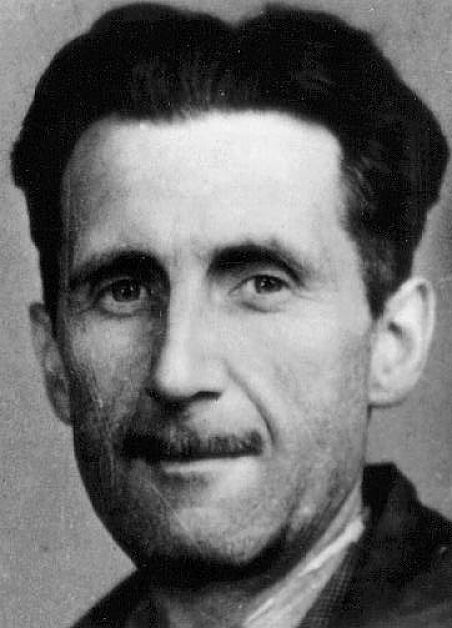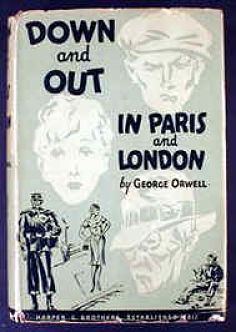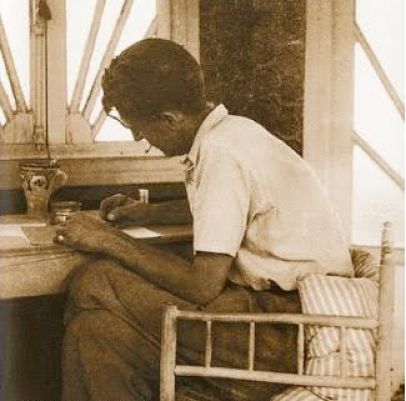Review of Down and Out in Paris and London by George Orwell



Orwell also describes the reality and stark features of the French hospitality industry in great detail. He highlights the slave-like occupation of the 'ploguer'; the crude hygiene in the Hotel X and the thieving culture amongst staff at the Hotel.
Orwell describes the personalities of the Hotel staff; focusing on the class system that dominated the relationship between the staff. The he describes the character of the cooks; the unique ‘outlook’ of waiters and how much each of the staff take pride in their pride.
Orwell uses the characters in the text to expose the stark truth about the all encompassing poverty of the times, building wonderful personalities and telling rich memorable stories using these characters.
Of the array of characters in the text, there are several that serve as ‘companions’ for Orwell on his journey.
Of these ‘companions’, Boris is the most significant as he is accompanies Orwell the longest. Orwell Introduces Boris in chapter V, when he goes to see if he could possibly get a job as a dishwasher, to no avail.
Boris is a Russian waiter who by nature is ultra-optimistic - except when starved. He loves all things military, as he used to be a soldier.
"Anything to do with soldiers pleased him. His favourite cafe was the Gloserie des Lilas in Montparnasse, simply because the statue of Marshal Ney stands outside it." P24
At times Boris says quite obviously untrue statements about life .e.g. “Nothing is easier to get than money MON AMI”.
Together Orwell and Boris seek out work in Paris, going to hotels, cafeterias looking for work - at one stage even the docks. Although they do not find jobs, their adventures around Paris are memorable, range from visits to make shift employment agency cafes to writing articles about English politics for communists.
Boris is a key component in Orwell’s description of the dominance of poverty in Paris. Orwell's account of Boris’ dressing regime is one of the first in describing this reality.
"He shaved without so, and with a razor-blade two months old, tied his tie so that the holes did not show, and carefully stuffed the soles of his shoes with newspaper. Finally, when he was dressed, he produced an ink-bottle and inked the skin of his ankles where it showed through his socks. You would never have thought, when it was finished, that he had recently been sleeping under the Seine bridges." p32-33
The fact that Boris goes to such extreme lengths to make himself look presentable says a lot about is personality - even when starving and poverty stricken he keeps up the strict routine.
Another major element of Orwell’s description of the tragic and all-consuming poverty is the tramps. They live in horrible conditions and live a futile life on the road. There are numerous examples from the book that attest to this. But Orwell seems to have a lot of empathy for the tramps and their character and their resilience in the face of poverty and hardship.
"But though the case obviously wants considering, one cannot even start to consider it until one has got rid of certain prejudices. These prejudices are rooted in the idea that every tramp, IPSO FACTO, is a blackguard." P238
When discussing tramps (and how he seeming acts towards them) in the text Orwell regards them with a lot of respect.
The Tramps in the text are colourful, intelligent and at times quite amusing - even though Orwell describes the as “...the most docile, broken spirited creatures imaginable” P23.
One tramp in particular, Bozo the screever, a pavement artist, stands out in the book. Bozo gives an opinion on poverty that Orwell has not seen before and for this reason Bozo intrigues Orwell.
"He had not eaten since the morning, had walked several miles with a twisted leg, his clothes were drenched, and he had a halfpenny between himself and starvation. With all this, he could laugh over the loss of his razor. One could not help admiring him." P221
Orwell spots the unique outlook that Bozo has in life - to never let poverty break you. Most of Orwell's time in London is spent with tramps, even going as far as to attempt to defend them to a certain extent in his notes. Because of this, they are major components is his description of the extreme poverty that prevailed in London.
Although for the majority of the text Orwell is unemployed - of a short while he is employed at the Hotel X in Paris. While at the Hotel X, Orwell encounters the rich personality of the hotel and the staff. He additionally discovers the vile reality of the hospitality industry at that time.
Although only employed as a Plongeur at the Hotel X, Orwell observes the whole process of hotel and the people that make it run. Making observations about each ‘class’ of employee. The waiters have, as Orwell put it, “...the mentality, not of a workman, but of a snob…they have the pleasure of spending money by proxy” P89.
The waiters intent to one day be the costumer but since they live on tips can never achieve their goal. The waiters Orwell describes generally are quite vain and very cunning, not above stealing. The cooks in the Hotel X are quite different. They take pride in their work and Orwell speak more highly of them then he does the waiters.
"....he takes a genuine artistic pride in his work, which demands very great skill. It is not the cooking that is so difficult, but the doing every/thing to time" P88
Although Orwell is constantly berated by the cooking staff he seems to admire them for their skill. The appalling state of hygiene in the Hotel X is astounding and Orwell describes the dirty state of the kitchens in the text.
"The dirt in the Hotel X, as soon as one penetrated into the service quarters, was revolting. Our cafeterie had year-old filth in all the dark comers... we had no orders to be genuinely clean, and in any case we had no time for it... we saved time by being dirty. " p 92
Boris offers great optimism to Orwell as they seek work in Paris. As well as highlighting lengths a nearly homeless waiter must go to in order to be presentable.
The tramps graphically portray the reality of being homeless in England. They also provide amazing personalities that add depth to the story. Orwell even defends them in his notes.
The cleanliness at the Hotel X was awful but this was a reality in the hospitality industry at the time. The staff at the Hotel X had rich and diverse personalities each ‘class’ having a different outlook on life but all taking genuine pride in their work.
Orwell uses the characters in the text to tell his story, the rich and believable characters help to describe the real picture of poverty in London and Paris.
"Boris was lying asleep, naked, his large belly making a mound under the grimy sheets, chest spotted with insect bites. As I came in he woke up, rubbed his eyes and groaned deeply...it did not seem much use to ask whether he still had his job at the Hotel Scibe." p 30.